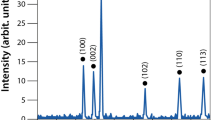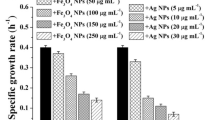Abstract
THE use of pH buffers for stabilizing the pH of growth media has become common bacteriological practice. There do not appear to be any reports, however, of the similar use of chelating agents for controlling the concentration of metal ions as ‘metal buffers’1,2. With metal ions there is a more complex situation, of course, since there are few chelating agents selective for one particular metal. An observed effect on bacterial growth can, therefore, be due to simultaneous sequestration of several metal ions and this must be allowed for in designing experiments.
This is a preview of subscription content, access via your institution
Access options
Subscribe to this journal
Receive 51 print issues and online access
$199.00 per year
only $3.90 per issue
Buy this article
- Purchase on Springer Link
- Instant access to full article PDF
Prices may be subject to local taxes which are calculated during checkout
Similar content being viewed by others
References
Schwarzenbach, G., Chimia (Switz.), 3, 1 (1949).
Raaflaub, J., Methods Biochem. Anal., 3, 301 (1956).
Bjerrum, J., Schwarzenbach, G., and Sillén, L. G., “Stability Constants. Part 1 : Organic Ligands” (Chemical Society, London, 1957).
Shooter, R. A., and Wyatt, H. V., Brit. J. Exp. Path., 36, 341 (1955).
Author information
Authors and Affiliations
Rights and permissions
About this article
Cite this article
RICHARDSON, G. Chelating Agents for Selective Growth of Bacteria. Nature 189, 78–79 (1961). https://doi.org/10.1038/189078b0
Issue Date:
DOI: https://doi.org/10.1038/189078b0
Comments
By submitting a comment you agree to abide by our Terms and Community Guidelines. If you find something abusive or that does not comply with our terms or guidelines please flag it as inappropriate.



